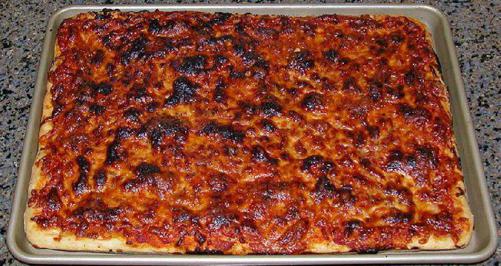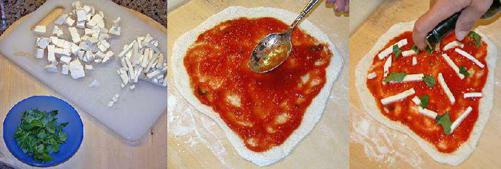Passionate About Pizza: Making Great Homemade Pizza (35 page)
Read Passionate About Pizza: Making Great Homemade Pizza Online
Authors: Curtis Ide
Tags: #Baking, #Cookbook, #Dough, #Pizza

When you are ready to shape each piece, drop it from its container into a pile or bowl of flour. Turn the dough ball over to cover it all over with flour. Gently transfer it to a work surface without pressing any portion. Do not press this dough flat unless it will not thin out any other way. Gently place your fingers underneath opposing edges of the dough and gently pull it. Keep moving your hands around and keep gently stretching until the dough is about eight to ten inches in diameter and quite thin.
Try to pull and shape each piece into a flat circle but be prepared that due to its thinness it may not be possible to maintain a circle. Once the dough is close to the desired size, carefully lay the dough onto a prepared pizza peel. Gently configure the dough into its final shape.
Assembly
– Spread a thin, even layer of sauce over the pizza up to one inch from the edge. This wide, un-sauced rim will puff up to create the proper edge. The layer of sauce should be thick enough so that you do not see bare spots through the sauce and look slightly like there are puddles on the dough. Spread the cheese slices evenly on top of the sauce. Evenly distribute some pieces of basil leaves over the pizza. The sauce and cheese will migrate toward the center, so you should put a little less in the center; otherwise, the cooked pizza may be soggy in the center. Drizzle a small amount of fruity olive oil over the pizza. Sprinkle a small amount of coarse-grained sea salt and some freshly ground pepper over the pizza.
Because this pizza bakes for such a short time the flavors of the basil, salt, pepper, and olive oil will stay somewhat separate; you can taste this as you eat it. It is quite different from American-style pizza.
Baking
– Bake at as high a temperature as possible (650 to 800 degrees Fahrenheit) for 90 seconds to six minutes; the actual baking time will vary depending on the actual temperature of the oven.
You want to bake the pizza so that the crust browns nicely and crunchy-chewy, but not quite burned. Because the pizza cooks at such a high temperature, do not leave the pizza unattended for any length of time. You want to cook the pizza until it is well cooked and it may have spots on the edge or bottom that burn. It may feel uncomfortable to cook it for that long but that is how you make authentic Italian-style pizza.
Serving
– After removing the pizza from the oven, let it stand for a couple of minutes on a trivet until the cheese stops bubbling and the pizza cools slightly. This allows the toppings and cheese to set prior to serving.
Serve the pizza as soon as possible. You might want to serve each pizza as you cook it.
If you have one, serve the pizza on a perforated pan. The holes in the pan let steam and sauce out so that the crust does not become soggy.
Variations
Be prepared to experiment with the formulation of the dough and baking time to meet the vagaries of your specific high temperature or wood-fired pizza oven.
Dough
– New York-style Dough or Slow Rise Dough (modified to have high water content)
Sauce
– Fresh Plum Tomato Sauce, Mexican Chile Sauce, Squashed Tomato Sauce, Chicago-style Sauce, or virtually any pizza sauce. Using uncooked sauce helps keep the tastes vibrant because the sauce will cook some as the pizza bakes in the high temperature oven.
Toppings
– You can use virtually any edible cheese, vegetable, or meat in small quantities.
Assembly and Baking
– You will generally assemble and bake this pizza on a pizza peel in a wood-fired oven.
Thick-Style Pizza Recipes
The
Passionate About Pizza System
You will make great homemade pizza every time you try if you ignite your passion and follow a systematic approach to making pizza. Plan your pizza-making activities, use the same equipment and high-quality ingredients each time, use proven preparation techniques, rely on your RECIPES, and work to make continual improvements.
Thick-style Pizza Recipes
Thick-style pizza is very popular. The fact that the shaped pizza dough is allowed to rise before baking is what gives the cooked pizza a thicker crust; hence the name. Virtually all thick-style pizzas are assembled, rise, and bake in a pan. You can turn almost any thin-style pizza into a thick-style pizza by placing the dough in a pan after shaping and allowing it to rise before assembling the pizza. You would typically use one and a half times the dough for a thick-style pizza as you would have used for a thin-style pizza of the same size in order to get additional thickness in the crust.
However, there are some specific styles of thick-style pizza which are generally available that are not just an adaptation of thin-style pizza. Chicago-style pizza and Chicago-style Stuffed pizza are Midwestern inventions; the pizza is heavenly. Sicilian-style pizza (sometimes called Bakery-style pizza) is a classic pizza that was widely available when Italian bakers owned most pizzerias.
The characteristics of the various thick-style pizza types are as follows (click to follow link):
Sicilian-style Pizza
– thick crust, rectangular, baked in sheet cake pans, few toppings, and heavy with sauce
Chicago-style Pizza
– thick crust, cornmeal dough, rich sauce and toppings, baked and served in a pan
Chicago-style Stuffed Pizza
– double crust, toppings inside, sauce on top, baked and served in a pan
Sicilian-style Pizza

Sicilian-style pizza is party pizza, plain and simple. At many old-style bakeries and pizzerias, you can pick up 1/2 sheet, a full sheet, or 20 sheets. Make sure that you have plenty of eaters and plenty of your favorite beverages!
Pizzerias make Sicilian-style pizza, sometimes called Bakery-style pizza, in the same pans used for sheet cakes. The dough is thick and more like bread than pizza dough. There is frequently more sauce than cheese on top and relatively few toppings. You would not see more than one or two additional toppings and almost never a “kitchen-sink” Sicilian-style pizza. A good Sicilian-style pizza has little indentations filled with rich tomato sauce and the cheese is nicely browned and it tastes as good cold the second day as it is hot.
Sicilian-style pizza takes on its unique characteristics first by allowing the dough to rise in the pan so that it will puff up nice and thick while cooking. In addition, immediately prior to spreading the sauce, you make little dimples in the dough using your fingertips; these dimples catch sauce and cheese.
Each pizzeria uses slightly different sauce, different varieties of cheese, and a different blend of herbs to give a special taste to their pizza. One of my favorite pizzerias had a sweet sauce that made their pizza taste great and unique at the same time.
Cheesy Party Pizza
Makes one eleven and a half by seventeen-inch pizza.
1 recipe Sicilian-style Dough (see recipe
page 95
)
olive oil, optional
about 2 cups Sweet Pizza Sauce (see recipe
page 118
)
8 – 10 ounces Mozzarella cheese, shredded
Italian herbs
Romano cheese
unbleached all-purpose flour (for kneading and shaping)
Resting
–
After the dough has risen, punch it down with one fist, take it out of the bowl, and knead it briefly (about one minute) without adding any flour, to release the large air bubbles. Shape the dough into a flat rectangle about one inch thick; it should be about twice as long as it is wide. Sandwich the dough between two layers of plastic wrap and set it in the center of the not yet oiled pan to rest. Let it rest for five to ten minutes (up to a maximum of twenty minutes) before shaping it.
Shaping
– You shape Sicilian-style pizzas by either rolling the dough to the desired size with a rolling pin or pressing the dough to shape in the pan. Spread a heavy coat of oil over the surface of an 11 ½ by 17 inch baking sheet or sheet cake pan.
Rolling Dough Into Shape
– Place the rested dough on a work surface and coat both sides with flour. Flatten the dough with the palms of your hands. Using a rolling pin roll the dough into a rectangle that is just larger than your sheet pan. When the dough has reached the desired size, place the rolled dough on the oiled pan. Gently drape the dough into the pan so that it lies smoothly at the edges and into the corners of the pan. You do not need to create a rim around the dough. Just size the dough so that it bunches up a bit at the edge of the pan around the entire pizza. You can cut off any excess dough with a knife. You may need to pull the corners of the dough in order to get them to square off and reach the corners of the pan.


